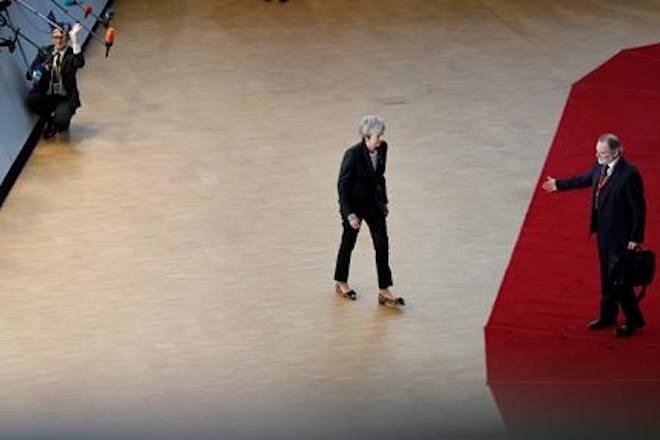British Prime Minister Theresa May was seeking a lifeline from European Union leaders Thursday after winning a no-confidence vote among her own Conservative lawmakers — but only after putting a time limit on her leadership.
May won the vote after promising lawmakers at a private meeting that she would quit before Britain’s next national election, scheduled for 2022.
Arriving in Brussels for an EU summit, May said that “in my heart I would love to be able to lead the Conservative Party into the next general election.”
“But I think it is right that the party feels that it would prefer to go into that election with a new leader,” May said. She didn’t specify a date for her departure.
May was meeting Irish Prime Minister Leo Varadkar and European Council President Donald Tusk Thursday before the summit, where she will seek reassurances about the deal that she can use to win over a skeptical British Parliament, particularly pro-Brexit lawmakers whose loathing of the deal triggered Wednesday’s challenge to her leadership.
May caused an uproar in Parliament this week when she scrapped a planned vote on the deal at the last minute to avoid a heavy defeat. Two days later she won a leadership vote among 317 Conservative lawmakers by 200 votes to 117.
The victory gives May a reprieve — the party can’t challenge her again for a year. But the size of the rebellion underscores the unpopularity of her Brexit plan.
The EU is adamant there can be no substantive changes to the legally-binding withdrawal agreement but have suggested that there could be some “clarifications.”
“The deal itself is non-negotiable,” Dutch Prime Minister Mark Rutte said as he arrived in Brussels. “So today is about clarification.”
Read more: UK Prime Minister Theresa May wins party no-confidence vote, but troubles remain
Read more: UK’s May lobbies EU leaders in fight to save Brexit deal
Rutte said EU leaders were willing to listen to May, who will address them before a summit dinner on Thursday.
May said her focus “is on ensuring that I can get those assurances that we need to get this deal over the line.”
“I don’t expect an immediate breakthrough, but what I do hope is that we can start work as quickly as possible on the assurances that are necessary,” she said.
U.K. Brexit Secretary Stephen Barclay told the BBC that there were signs of “positive” movement from the EU on the most intractable issue — a legal guarantee designed to prevent the re-implementation of physical border controls between Northern Ireland, which is part of the U.K., and the Republic of Ireland, a member of the EU.
The provision, known as the backstop, would keep the U.K. part of the EU customs union if the two sides couldn’t agree on another way to avoid a hard border.
Pro-Brexit lawmakers strongly oppose the backstop, because it keeps Britain bound to EU trade rules, and unable to leave without the bloc’s consent. Pro-EU politicians consider it an unwieldy and inferior alternative to staying in the bloc.
“There is movement, but the question is how do we ensure that that movement is sufficient for colleagues?” Barclay said. “But colleagues also need to focus on the fact that alternative deals also need a backstop.”
Re-opening the negotiations to address the border problem also raises the risk that May could lose concessions on other parts of the deal, Barclay said.
Among EU leaders there is sympathy for May’s predicament — but also exasperation at Britain’s political mess and little appetite to reopen the negotiations. On Thursday, the German parliament has approved a motion stating that the Brexit deal can’t be renegotiated, underlining the stance of the government and EU allies.
The largely symbolic motion states that “there will not be an agreement that is better and fairer for both sides. Any hope that a rejection of the agreement could lead to its renegotiation must prove to be illusory.”
Meanwhile, the clock is ticking down to Britain’s departure from the bloc, which is due to take place on March 29 — deal or no deal. A parliamentary schedule published Thursday shows the Brexit deal won’t be debated or voted on before the House of Commons adjourns for a two-week Christmas break on Dec. 20.
The no-confidence vote has left lawmakers from the governing Conservative Party at loggerheads over the way ahead.
Prominent pro-Brexit legislator Jacob Rees-Mogg said that May should resign even though she won the vote.
He said Britain needed “somebody who can unite the country and the Conservative Party, and she has to ask herself is she realistically that person?”
Foreign Minister Alistair Burt said in a tweet that Conservative Brexiteers would never be satisfied.
“They never, ever stop. … After the apocalypse, all that will be left will be ants and Tory MPs complaining about Europe and their leader,” he wrote.
___
Danica Kirka reported from London. Geir Moulson in Berlin and Lorne Cook in Brussels contributed to this story.
___
Jill Lawless And Danica Kirka, The Associated Press



